
Journal of the American College of Emergency Physicians Open
Scope & Guideline
Connecting Global Experts in Emergency Medicine
Introduction
Aims and Scopes
- Clinical Practice and Management in Emergency Medicine:
The journal publishes research on clinical decision-making, management strategies, and treatment protocols in emergency settings, aiming to enhance patient outcomes and safety. - Emergency Medical Services (EMS) and Prehospital Care:
Research related to EMS practices, prehospital interventions, and the integration of emergency care within community health systems is emphasized, highlighting the critical role of EMS in patient care. - Population Health and Social Determinants of Health:
The journal addresses the impact of social determinants on health outcomes, focusing on vulnerable populations and the importance of equitable access to emergency care services. - Innovations in Emergency Medicine:
JACEP Open encourages submissions on novel technologies, procedural advancements, and evidence-based innovations that can improve the efficiency and effectiveness of emergency medical services. - Education and Training in Emergency Medicine:
The journal features studies on educational methodologies, training programs for emergency medicine professionals, and the development of competencies essential for effective emergency care. - Public Health Emergencies and Disaster Response:
Research related to responses to public health crises, disaster preparedness, and the role of emergency medicine in managing large-scale health emergencies is a core focus. - Pediatric Emergency Medicine:
The journal includes studies specifically addressing pediatric patients in emergency settings, emphasizing unique challenges and management strategies required for this population.
Trending and Emerging
- Telemedicine and Remote Care:
The surge in telemedicine research highlights its role in emergency care, particularly during the COVID-19 pandemic, showcasing its potential for improving access and patient management in emergencies. - Opioid Crisis and Substance Use Disorders:
Emerging themes around opioid use disorder, harm reduction strategies, and the role of emergency medicine in addressing substance use crises are increasingly prevalent, reflecting the urgent need for effective interventions. - Mental Health Emergencies:
Research focusing on the management of mental health crises in emergency departments is gaining traction, emphasizing the integration of mental health services into emergency care practices. - Health Equity and Social Justice:
There is a growing emphasis on health equity, with research addressing disparities in emergency care access and outcomes among marginalized populations, highlighting the need for systemic change. - Artificial Intelligence and Technology Integration:
The integration of AI and advanced technologies in emergency medicine, particularly in diagnostics and decision-making, is emerging as a significant trend, promising to enhance the efficiency and accuracy of emergency care. - Pediatric Emergency Medicine Innovations:
Innovative practices and research specifically targeting pediatric emergency care are on the rise, reflecting a commitment to improving outcomes for younger patients in emergency settings. - COVID-19 Impact Studies:
The ongoing analysis of COVID-19's impact on emergency departments, including patient flow, resource allocation, and care delivery, continues to be a prominent area of research, shaping future practices.
Declining or Waning
- Traditional Emergency Medicine Procedures:
There has been a noticeable decrease in the publication of studies focused solely on traditional emergency procedures, as the field shifts towards evidence-based practices and innovative technologies. - Basic Clinical Case Reports:
The frequency of basic clinical case reports has declined in favor of more comprehensive studies that examine broader trends, outcomes, and systematic reviews, reflecting a preference for impactful research. - Single-Center Studies:
Research limited to single-center experiences is being overshadowed by multicenter studies and collaborative research efforts, indicating a trend towards more generalizable findings and broader implications. - Basic Epidemiological Studies:
While epidemiological research remains important, there has been a shift towards more complex studies that integrate social determinants of health and health disparities, leading to a decline in simplistic epidemiological analyses. - Non-Evidence-Based Guidelines:
There is a waning interest in publishing non-evidence-based guidelines or recommendations, as practitioners increasingly seek data-driven insights to inform clinical practices.
Similar Journals

African Journal of Emergency Medicine
Fostering Collaboration for Better Emergency ServicesAfrican Journal of Emergency Medicine, published by ELSEVIER, serves as a pivotal platform for disseminating innovative research and advancements in emergency medicine and critical care nursing. Launched in 2011, this Open Access journal has quickly garnered attention for its commitment to enhancing healthcare delivery across Africa, catering to a diverse audience of researchers, practitioners, and students. With an impressive rank of #44/109 in Emergency Medicine and positioning itself in the Q2 category for Critical Care Nursing and Emergency Nursing in 2023, the journal has established itself as a significant contributor to the medical community. The journal encourages the submission of high-quality research, reviews, and case reports that can inform clinical practices and emergency protocols across the continent. Its accessibility, reflected by its open access model, ensures that vital findings are available to those who need it most, thus fostering greater collaboration and innovation in emergency healthcare. With a focus on improving patient outcomes and advancing the field, the African Journal of Emergency Medicine is an essential resource for all who are committed to emergency care and related disciplines.

BMC EMERGENCY MEDICINE
Pioneering insights for critical healthcare challenges.BMC Emergency Medicine is a premier, open-access journal that has been at the forefront of the field of emergency medicine since its inception in 2001. Published by BMC in the United Kingdom, this journal is distinguished by its impact factor and remarkable Q1 ranking in emergency medicine, placing it among the top-tier publications in this vital area of healthcare. With a current Scopus rank of #30 out of 109 in the category of Emergency Medicine, and occupying the 72nd percentile, BMC Emergency Medicine is a leading platform for researchers and practitioners alike to disseminate their findings related to urgent and critical care. The journal embraces a broad scope within emergency medicine, encouraging submissions on a wide range of topics including clinical practice, innovative techniques, public health, and policy issues that critically affect emergency care. The open-access model ensures that high-quality research is readily available to the global community, fostering collaboration and advancing knowledge in the field. For those dedicated to improving patient outcomes in emergency settings, BMC Emergency Medicine represents an invaluable resource and community.
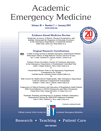
ACADEMIC EMERGENCY MEDICINE
Uncovering Breakthroughs in Emergency MedicineACADEMIC EMERGENCY MEDICINE, published by Wiley, stands as a leading journal in the field of emergency medicine, distinguished by its impressive rankings, including Q1 categories in both Emergency Medicine and Miscellaneous Medicine. With an ISSN of 1069-6563 and an E-ISSN of 1553-2712, the journal covers a broad array of topics relevant to emergency medicine, advancing research from its inception in 1994 up to 2024. Ranked #8 out of 109 in its category, this journal sits in the 93rd percentile according to Scopus, underscoring its significance and influence within the academic community. Although it does not currently offer open access options, its rigorous peer-review process and comprehensive publication standards ensure that only the highest quality research reaches its readership. Aimed primarily at researchers, practitioners, and students in the field, ACADEMIC EMERGENCY MEDICINE serves as an essential resource for those seeking to enhance their understanding and practice of emergency care, making significant contributions to both theory and clinical applications in the field.
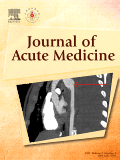
Journal of Acute Medicine
Elevating standards in acute medical practice.Journal of Acute Medicine is a pivotal platform for disseminating cutting-edge research within the fields of Critical Care and Intensive Care Medicine and Emergency Medicine. Published by the Taiwan Society of Emergency Medicine in the Netherlands, this journal serves as a vital resource for healthcare professionals and researchers devoted to advancing acute medical practice. With an ISSN of 2211-5587 and an E-ISSN of 2211-5595, the journal features a collection of high-quality articles that focus on the latest developments and challenges facing emergency healthcare systems. Since its inception in 2011, the journal has achieved a respectable Q3 ranking in both critical care and emergency medicine categories, demonstrating its commitment to scholarly excellence. Although it currently does not operate as an open-access publication, the journal provides a critical forum for exchanging knowledge, fostering collaborations, and enhancing clinical practices, ensuring that it remains an essential read for those involved in acute medical care.
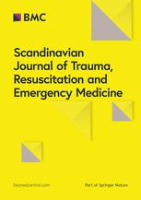
Scandinavian Journal of Trauma Resuscitation & Emergency Medicine
Empowering Clinicians with High-Impact ResearchThe Scandinavian Journal of Trauma Resuscitation & Emergency Medicine, published by BMC, stands as a leading open-access platform dedicated to advancing the fields of trauma, resuscitation, and emergency medicine since its inception in 2008. With an ISSN of 1757-7241 and an impressive track record, this journal has established itself in the top quartile of critical care and emergency medicine, achieving Q1 rankings in both categories for 2023. Its Scopus rankings further underscore its importance, placing it among the top 11 journals in emergency medicine and the 23rd in critical care and intensive care medicine, signaling a strong impact within the academic community. As we converge toward 2024, the journal continues to provide researchers, clinicians, and students with valuable access to cutting-edge research and developments in the sector, contributing significantly to knowledge, practice, and policy in emergency care. Located in the heart of the United Kingdom, the journal remains dedicated to its mission of fostering innovation and dissemination of high-quality research, ensuring that vital medical advancements reach those who need them most.
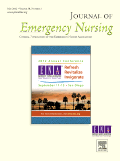
Journal of Emergency Nursing
Fostering Knowledge for Superior Patient OutcomesJournal of Emergency Nursing, published by Elsevier Science Inc, serves as a premier platform for advancing the field of emergency nursing. Since its inception in 1975, this peer-reviewed journal has established itself as a vital resource for researchers, practitioners, and educators alike, with a notable impact factor and current ranking of #8 out of 32 in the Emergency Nursing category, placing it in the 76th percentile. The journal's commitment to the dissemination of high-quality evidence, innovative practices, and essential insights makes it an indispensable tool for those seeking to excel in acute care settings. Although not open access, the Journal of Emergency Nursing is dedicated to fostering knowledge and improving patient outcomes through robust research and comprehensive reviews, aligning closely with its mission to enhance emergency nursing practices and education through every issue until 2024 and beyond. For professionals and students keen on staying at the forefront of emergency care advancements, this journal provides a wealth of knowledge and resources, reflecting the critical issues and developments shaping the future of healthcare.
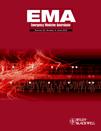
Emergency Medicine Australasia
Enhancing Patient Outcomes Through Collaborative ResearchEmergency Medicine Australasia, published by WILEY, stands as a premier journal in the field of emergency medicine, underlining its significance through its distinguished ranking as Q1 in Emergency Medicine and Q2 in Medicine (miscellaneous) as of 2023. The journal, which has been in circulation since 2004, provides a platform for high-quality research, clinical studies, and reviews that contribute to the advancements in emergency medicine practices. With a Scopus rank of 28 out of 109 in its category, it occupies a notable position within the medical community, boasting a 74th percentile ranking that reflects its impactful contributions to the field. Although it operates primarily on a subscription basis, Emergency Medicine Australasia is essential reading for researchers, practitioners, and students seeking to stay updated on the latest developments and methodologies in emergency care. This journal not only aims to disseminate critical knowledge but also fosters a collaborative environment for sharing innovations that improve patient outcomes and emergency services.
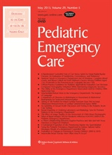
PEDIATRIC EMERGENCY CARE
Delivering Critical Insights for Pediatric Emergency ProfessionalsPediatric Emergency Care, published by Lippincott Williams & Wilkins, serves as a vital resource within the fields of Emergency Medicine, Pediatrics, and Child Health. Established in 1985, this journal offers a platform for the dissemination of impactful research, offering critical insights for healthcare professionals dedicated to improving emergency care for children. With an impressive impact factor, it ranks in the Q2 category in Emergency Medicine and Pediatrics, highlighting its significance in advancing clinical practices and outcomes. Although not an open-access journal, it provides extensive access options to ensure the research is available to a broad spectrum of readers. The journal's rigorous standards and commitment to excellence make it an essential tool for researchers, practitioners, and students aiming to stay at the forefront of pediatric emergency care advancements.
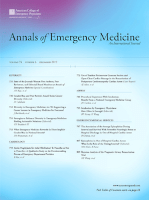
ANNALS OF EMERGENCY MEDICINE
Advancing the Frontiers of Emergency MedicineANNALS OF EMERGENCY MEDICINE is a leading peer-reviewed journal dedicated to the advancement of emergency medicine, published by MOSBY-ELSEVIER. With an impressive impact factor and a prestigious ranking of Q1 in the field, this journal serves as an essential platform for disseminating innovative research findings, clinical practices, and policy developments within emergency medicine. Recognized for its high-quality contributions, it ranks #6 out of 109 in Scopus's Emergency Medicine category, placing it in the top 6% of journals in the field. Since its inception in 1980, ANNALS OF EMERGENCY MEDICINE has consistently provided valuable insights to researchers, practitioners, and students, fostering a deeper understanding of emergency care challenges and solutions. While the journal is not open access, it remains a cornerstone for those seeking to stay at the forefront of emergency medicine advancements, providing access to critical research within the field.
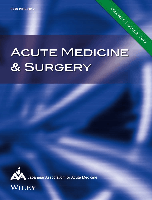
Acute Medicine & Surgery
Elevating surgical practices for better patient outcomes.Acute Medicine & Surgery is a notable peer-reviewed journal published by WILEY, focusing on the dynamic intersection of acute medicine and surgical practice. With an ISSN of 2052-8817, this open-access journal has been committed to disseminating high-quality research since its transition to open access in 2017. Aimed at an audience comprising researchers, clinicians, and students in the medical field, it facilitates broader access to innovative studies that enhance understanding and practice within acute care settings. The journal covers a wide range of topics, including emergency medicine, trauma care, critical analysis of surgical techniques, and best practices in clinical management. By providing a platform for cutting-edge research and case studies, Acute Medicine & Surgery plays a pivotal role in improving patient outcomes and advancing the field of acute healthcare.